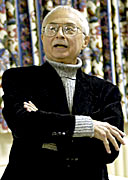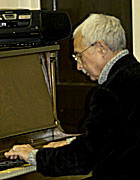Dr. David Z. Kushner, professor and head of the musicology/music history at the University of Florida, enlightened me, November 25, when he presented a lecture with musical accompaniment to about two dozen music lovers at United Hebrew Congregation in Joplin.

Dr. David Z. Kushner lectures to a group assembled at the United Hebrew Congregation in Joplin. Holding a Ph.D. from the University of Michigan, Kushner published The Ernest Bloch Companion in 2002. He is the father of Jeremy Kushner, a professor of music at Missouri Southern State University.
The Jewish Works of Ernest Bloch is Kushner's favorite musical subject and for which he is considered today's foremost specialist. Through a concise discussion, integrating the composer's life and works--how Bloch treats the influence of religion in his creative efforts--Kushner encourages a rethinking of Bloch's place in the history of twentieth century music.
Born in Switzerland in 1880, the French-speaking Bloch became one of the few successful Swiss composers, Kushner said. Although Bloch's family were members of an orthodox shul and he was bar mitzvahed, Bloch himself had no formal religious education from his early teens on. He was "a student of God's university," Kushner added.
Bloch studied violin in Brussels where he learned to weave elements of nineteenth century German-style music with that of Oriental and impressionistic Parisian themes. In 1906 his study of the Bible, while instilling a sense of pride, left him with a fear of discovering too much of himself. According to Kushner, Bloch questioned how he could lead the life he was leading, a time when the music of Richard Wagner co-mingled with the ideas leading to the philosophy of Adolph Hitler.

Dr. Kushner has lectured and performed on the piano throughout the United States, and in Canada, Israel, Kenya, Australia and in eastern and western Europe. His appearance in Joplin was underwritten by the Endowment Fund of the United Hebrew Congregation.
In 1912 Bloch was at the forefront of creating Biblical works, large scale pieces, using the psalms as settings. Bloch knew little Hebrew for his original intention to use a text from the Book of Ecclesiastes. His work, Schelomo is a rhapsody for cello and orchestra whose title in part corresponds to the Hebrew name for Solomon. With the influence of cellist, Alexander Barjansky, the piece was recast by Bloch as more abstract musically than textorially descriptive, and is considered to be Bloch's most important work. An excerpt played by Kushner was morose, revealing the composer's depths of despair and longing.
Regarding Schelomo, Bloch is quoted as saying:
I do not propose or desire to attempt a reconstruction of the music of the Jews . . . or to base my work on melodies more or less authentic. I am not an archaeologist. I believe that the most important thing is to write good and sincere music--my music. It is rather the Hebrew spirit that interests me, the complex, ardent, agitated soul that vibrates for me in the Bible. The vigor . . . of the Patriarchs, the violence . . . in the books of the Prophets, the burning love of justice . . . the sorrow and the grandeur of the Book of Job, the sensuality of the Song of Songs. All this is in us, all this is in me, and it is the better part of me."
In the piece is heard the magnificence of Solomon's court, the great yearning and nocturnal world of the Song of Songs, and the weary meditations of Ecclesiastes, capped by the passionate outcry, "Vanity of vanities." And despite the vanity of the court, Kushner recounted how Bloch married a woman whom he called his "zesty Hamburger," and they had three children.
Preceding his family to the United States, Bloch, among other endeavors, attempted teaching composition at the Mannes School of Music in New York, but, Kushner said, he was "not cut out to be a teacher." The family united with him in 1919 and a year later Bloch became one of the founding members and director of the Cleveland Institute of Music, a position he held for the next five years. During this time, he composed Ba'al Shem, which Kushner considers the only large work on a Jewish theme in the Cleveland Period.
Calling Avodath Hakodesh (Sacred Service) the greatest choral work of the twentieth century, in which Bloch first assiduously had to study Hebrew, Kushner revealed the composer's disappointment over Leonard Bernstein's recording of the work which he felt demeaned its religious aspects. Bloch wanted the saying of Kadish only for religious services, not for public performances.
Bloch settled in Agate Beach, Oregon where he lived for 16 years until his death from cancer in 1959. He was near the sea in contrast to his life in land-locked Switzerland.
In summing up Bloch's religious beliefs, Kushner said that Bloch was not a true believer but that he was not an atheist either. Bloch believed that it was absurd to prove that God doesn't exist. Kushner compared Bloch's beliefs to that of Spinosa: "God is the substance of the universe. He must be great and impassive."






Comments